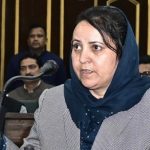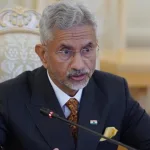Srinagar, Dec 05: Under the banner of ‘Viksit Bharat Sankalp Yatra’ – a nationwide outreach initiative of the Central government, J&K’s Health Department is focusing on the screening of non-communicable diseases.
The outreach initiative aims at informing citizens about 17-18 flagship schemes of the Central government started in the last eight to nine years in all the 2.7 lakh Panchayats of the country.
State Nodal Officer, National Health Mission, Dr Mohammad Shafi Koka, said during the ‘Viksit Bharat Sankalp Yatra’ they have been focusing on the outreach of health schemes. “We are focusing on health schemes like AB PM-JAY SEHAT scheme under which golden cards of the beneficiaries are generated,” he said.
The scheme has already transformed healthcare with more than 82.59 lakh beneficiaries in J&K and these schemes have achieved more progress over the past four years.
“We are taking the scheme to each nook and corner. During the yatra camps, people who are not yet registered are identified and their cards are created,” he said. Koka said the golden cards have been also distributed during the Yatra camps.
The NHM under the aegis of the National TB Elimination Program (NTEP) has been also focussing on screening suspected populations and their samples are collected during the yatra and then sent for examination.
“We are also stressing on screening of non-communicable diseases like hypertension and diabetes. In all the health camps people are examined in the OPDs,” Dr Shafi said.
During the ‘Viksit Bharat Sankalp Yatra’, the stalls of the health department remain abuzz with people and patients visiting health workers for check-ups and screening of NCDs.
The yatra is designed to educate and empower citizens about the government’s schemes. Launched by Prime Minister Narendra Modi on November 15 in Khunti, Jharkhand, the campaign aims to create awareness and foster engagement across the country.
The yatra is taking various plans and facilities of the government to those people who have been neglected so far, who don’t even have information about them. Even if they have information, they don’t know how to access them.
On the other side in every district hospital, there are NCD clinics where diabetic and hypertension patients are registered and they are also given free-of-cost drugs.
Dr Junaid Kousar, Nodal Officer, NCDs, Directorate of Health Services Kashmir (DHSK) said they also do awareness campaigns during which patients are encouraged to focus on preventions like avoiding smoking, avoiding salt etc.
“Due to inactive lifestyle people are involved in NCDs and these are life-threatening if the disease goes uncontrolled. We have been promoting healthy and active lifestyle over the years,” the Nodal Officer said.
“We have been screening the above 30 population. Now, we are going to start screening the above-18 population. Generally, the people will be screened. If a patient is detected, they are given treatment including precautions,” Dr Junaid said.
The four major NCDs are cardiovascular diseases (CVDs), cancers, chronic respiratory diseases (CRDs) and diabetes which share four behavioral risk factors – unhealthy diet, lack of physical activity, and use of tobacco and alcohol.
In May this year, the Ministry of Health and Family Welfare (MoHFW) renamed the National Programme for Prevention and Control of Cancer, Diabetes, Cardiovascular Diseases and Stroke (NPCDCS) to the National Programme for Prevention & Control of Non-Communicable Diseases (NP-NCD).





